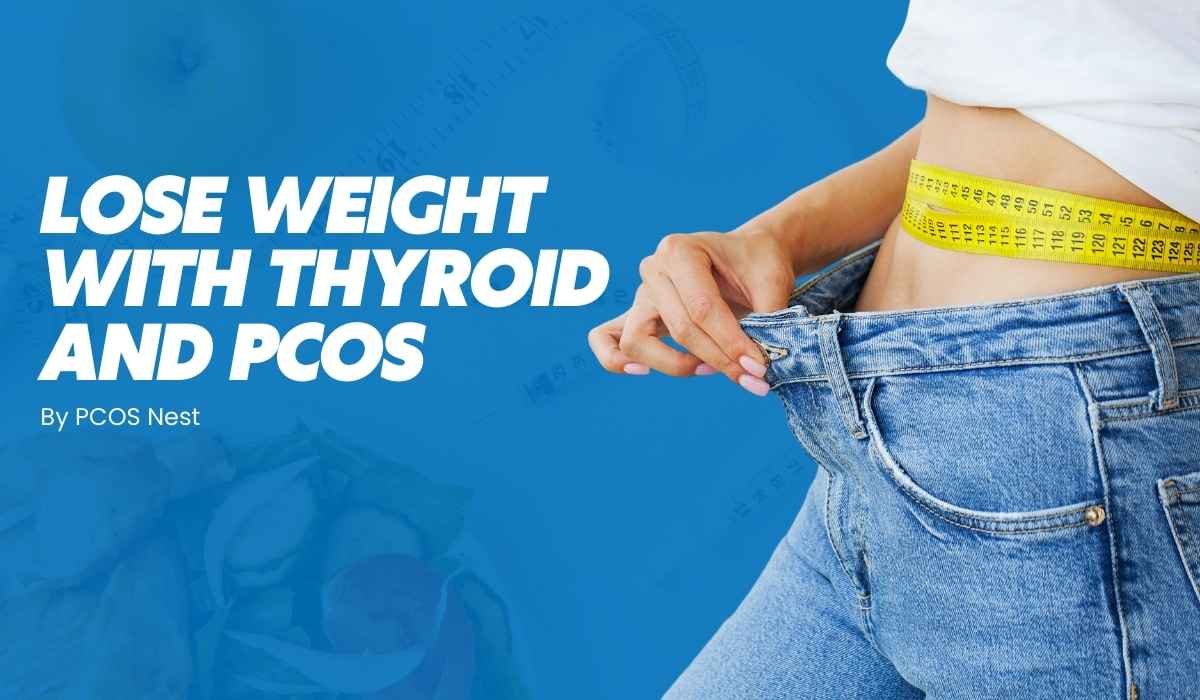PCOS and thyroid disorders (hypothyroidism) cause weight gain, because both these conditions affect hormones which play a vital role in metabolism, appetite, and fat storage.
In PCOS, high insulin levels and androgen hormones cause weight gain, and in hypothyroidism low levels of thyroid hormones (T3 & T4) slow metabolism which results in weight gain.

How to Lose Weight with Thyroid and PCOS:
Both these condition make it difficult to lose weight, but with healthy lifestyle changes weight loss is possible. However, this is not an overnight process, its take time.
1. Healthy Diet:
A healthy diet is the most important step for losing weight. Let’s see what to eat and what to avoid to lose weight with hypothyroidism and PCOS.
Food to Eat:
Include lean protein in your diet, because it helps in stabilizing blood sugar as its slow the absorption of glucose in blood. Protein also has high thermic effect that burns calories & boost metabolism. Lean protein food includes: eggs, chicken breast, Greek yogurt, lentils, beans, fish etc.
Focus on low-glycemic index & fiber-rich food to prevent insulin spikes and improve digestion. Like green vegetables, whole grains and fruits like cherries, grape fruit, orange, apple, strawberries and apricot.
Eat healthy fats because this helps in reducing inflammation and support hormone balance. Example of healthy fats are avocado, nuts, seeds (chia, flaxseeds, and walnuts), olive oil, and fatty fish (rich in omega-3s).
Use anti-inflammatory spices like turmeric, cinnamon, and ginger this helps in managing PCOS symptoms and reduces inflammation.
Selenium and zinc-rich foods are great for thyroid health and also helps in weight loss. Selenium deficiency can also cause reproductive problems, so its intake is very important. Brazil nuts and fish are great source of selenium. Meats from animals that ate plants or grains grown in selenium-rich soil have higher levels of selenium. Zinc is found in pumpkin seeds, Shellfish (like oysters), nuts and whole grains.
Food to Avoid:
Refined carbohydrates like white bread, pasta, pastries, sugary cereals, and white rice.
Sugary food and beverages like alcohol, sodas, energy drinks, desserts, and candy.
Fried foods, margarine, and baked goods with hydrogenated oils.
Processed and packaged Foods like frozen meals.
Goitrogenic Foods (in excess) like raw broccoli, cauliflower, and cabbage. Cook these vegetables to reduce their goitrogenic effect.
Too much consumption of caffeine.
Also Read: PCOS and Underactive Thyroid: How They Affect Your Health?
Junk food and fried items are enjoyable to eat, but what happens to our bodies afterward is hard to endure. That’s why it’s better to take care of our diet from the start and live a healthy and happy life.
2. Hydration:
Keep your body hydrated. Drink at least 8 glasses of water daily. Water increases resting energy expenditure (REE), means burn more calories even when body is at rest.
Proper hydration helps in lipolysis, the process of breaking down fat for energy. Without enough water, this process slows down.
Drinking water also improves bowel movements and prevents constipation.

3. Stay Positive and Reduce Stress:
I know that weight gain and these health problems can be stressful, but staying unhappy or tense is not a solution. When you feel worried, your body releases the stress hormone cortisol, which causes belly fat. So no stress in weight loss journey.
Every problem has a solution if handled wisely. Engage yourself in activities like gardening, painting, or organizing your space.
Don’t let others’ opinions define you. Your journey is about health and happiness, not meeting anyone else’s expectations. By making small, consistent changes to your lifestyle, you’ll see progress and feel more confident every step of the way. Prioritize your health, and remember, you are capable of amazing transformations.
4. Exercise:
Incorporate exercise into your daily routine. Exercise burns calories and also helps in improving insulin sensitivity.
Don’t do heavy exercise. Opt for light exercises like jogging, cycling, and yoga. Yoga poses like Cobra Bridge are helpful for thyroid health.

Also Read: Intermittent Fasting For PCOS and Insulin Resistance
5. 8-Hours Sleep:
Prioritize your sleep.
Sleep early and avoid screen time at least one hour before bed time. Inadequate or irregular sleep increases cortisol, that causes belly fat and weight gain. Have you ever noticed that people who do night duties like watchmen often struggle with weight issues. This is largely due to disrupted circadian rhythms and elevated cortisol levels.
6. Consult with Doctor:
Doctor consultation is very necessary. Because PCOS and hypothyroidism require personalized care. Self-care and lifestyle changes are important, but they work best when combined with expert advice. Regular check-ups ensure your progress is on track and allow adjustments to your treatment plan if needed.
FAQs:
What nutrients are good for PCOS and hypothyroidism?
Vitamin D, vitamin B, iodine, magnesium, zinc, iron, selenium, vitamin A, omega-3 fatty acids, probiotics, and antioxidants (e.g., Vitamin E and vitamin C) are good for PCOS and hypothyroidism.
Why is weight loss harder with thyroid and PCOS?
Both conditions slow down metabolism and cause hormonal imbalances, which make it harder to burn calories. Insulin resistance in PCOS and low thyroid hormone levels in hypothyroidism cause fat storage, especially around the belly. Due to this weight loss is difficult with thyroid disorders and PCOS.
What are the best drinks for thyroid and PCOS?
Spearmint tea, ginger tea, lemon Water, apple cider vinegar, and ABC juice (apple, beetroot & carrot) are best for thyroid and PCOS.
What does a PCOS belly look like?
A PCOS belly often appears as excess fat accumulation around the abdomen which gives a rounded or bloated look. This happens due to hormonal imbalances and insulin resistance, which promote fat storage in the midsection. The belly may feel firm rather than soft and is often resistant to typical weight-loss efforts.
Weight loss with PCOS and hypothyroidism is a bit challenging. Eat a balanced diet packed with whole foods, lean proteins, healthy fats, and fiber. Say goodbye to inflammatory culprits like refined carbs and processed snacks—they’re not doing you any favors.
Additionally, lifestyle habits play an important role. Incorporating regular exercise, managing stress, and maintaining good sleep hygiene are essential for achieving healthy and sustainable weight loss.

